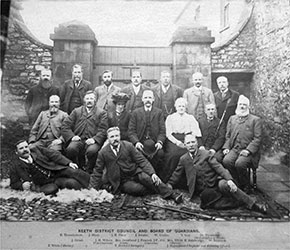POOR LAW PROJECT
During 2009/10 a group of volunteers mainly drawn from the Friends of Swaledale Museum embarked on a study to unearth the hidden history of life for the poor in 19th-century Swaledale and Arkengarthdale.
Working with the National Archives, the volunteers catalogued hundreds of letters, memos and reports held within the long-forgotten records of the Reeth Poor Law Union. The results of their labours are freely available online via the National Archives website http://discovery.nationalarchives.gov.uk/ . There, local and family historians are able to search by name, place, date and event, providing a level of detail found in no other records from the period. From the running of the local workhouse, to tales of family breakdown, greed and corruption, the records provide a detailed snapshot of a key period in Britain's history.
It is estimated that around 80 per cent of the population of England and Wales in the mid-1800s would have been affected by the Poor Law Unions. Yet despite their historic value much of what exists in the files remains a mystery as they are generally poorly catalogued and underused. Reeth is one of 22 Poor Law Unions which was involved in the 18-month project with around 250 volunteers across England and Wales cataloguing more than 100,000 pages of documents, covering from the mid-1830s to around 1870.
"The 19th-century saw a tremendous expansion in Britain's economy and huge increases in wealth and yet at the same time there was extreme poverty" said local coordinator Alan Mills. "These records will help researchers, family historians and academics, find out what life was really like for ordinary people."
For more information on the "Living the Poor Life" project see:
https://www.youtube.com/watch?v=ppsgzffqKJU (Preview) where Paul Carter, the National Archives’ principal modern domestic record’s specialist, describes the 2009 / 2010 project
and
http://media.nationalarchives.gov.uk/index.php/living-the-poor-life-power-relations/
where Paul Carter talks about some of the personal stories that have emerged from the Living the Poor Life project and about how poor law records uncovered illustrate power relations in the nineteenth century.
See also:
Living the Poor Life: a guide to the Poor Law Union Correspondence c 1834 – 1871 held at the National Archives by Paul Carter and Natalie Whistance. This guide for local and family historians introduces and explains the set of records which has recently been catalogued and can be downloaded free from the website of The National Archives (TNA MH12). It shows how this correspondence greatly extends our knowledge of life in the workhouse and the attitudes of society to poverty in the mid-nineteenth century. The records of 22 selected Poor Law Unions (including Reeth) have been catalogued and digitised, providing 4.6 million words searchable by place, person and subject.
To order a copy, email Dr Gill Draper on development.balh@btinternet.com - price £4.99 each including postage.
For information on workhouses generally see the excellent and comprehensive site at
http://workhouses.org.uk/
Finally to search the records at the National Archives go to:
http://discovery.nationalarchives.gov.uk/
and enter Reeth Poor Law Union in the search box. The records may be downloaded for free.
Alan Mills, February 2015


